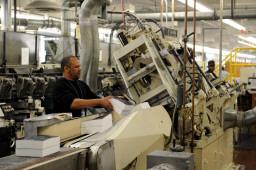Italy's GDP plummeted 5.9% in the first quarter of the year, over the same period in 2008, but Premier Silvio Berlusconi said the drop had been expected and the situation would gradually improve during the course of the year.
''There is a crisis and the data released today (Friday) was in line with what we expected. And although we are going through the worst crisis ever, the information we are getting from the business sector indicates that things are on the mend,'' the premier said.
The government's latest forecast had predicted that GDP would tumble 4.2% in the first quarter. The 5.9% drop was the worst since national statistics bureau began comparing the economy's quarterly performance.
According to Berlusconi, ''the psychological aspect is the most important factor in a crisis and this is why it is our job to promote optimism and confidence''.
The premier's call to look on the bright side was backed by the minister for the civil service, economist Renato Brunetta, who predicted that ''in the second half of the year we will see an improvement and GDP will gradually rise and shift from negative to positive''.
The center-left opposition failed to see any silver lining in the GDP data and former premier Massimo D'Alema of the Democratic Party (PD) pointed out how the drop in Italy's GDP was more than double that of the average for whole euro zone.
''In the face of such a dramatic situation for the nation, this government resorts to demagogy and confusion. The data released today indicates a collapse of the Italian economy, one which is much worse than in the rest of Europe, and yet our premier prefers to waste time,'' Alema said.
PD Secretary Dario Francheschini agreed and said that ''unfortunately, Istat's figures confirmed that the road to recovery will be a long one and the government and Italians will have to do all they can, even if the government appears to expect the crisis to go away by itself''.
''The premier says the greatest factor in the crisis is the psychological one. Maybe he should go and say that to someone who has lost their job or gone out of business. Optimism is not enough, concrete action is needed,'' he added.
GDP for the euro zone sank 2.5%, its worst fall since the euro was introduced ten years ago, which was just above the 2.6% decline for the United States.
In explaining why the data for Italy was not as bad as it looked, Berlusconi pointed to the fact that compared to the first quarter of last year, GDP in Germany plunged 6.9% and in the Netherlands by 4.5%, while France officially entered a recession with its second consecutive quarterly drop in GDP.
Friday's GDP report from Istat, which also showed a 2.4% drop over the fourth quarter of 2008, alarmed the country's retailers and small businessmen who had not expected it to be so steep.
The first quarter plunge in GDP, observed national retailers association Confcommercio, ''confirmed that the first three months of 2009 were the worst for the economy in decades both in Europe and America''.
Confcommercio, however, added that ''it would appear that this deep and structural crisis has hit rock bottom. There are the first signs of an improvement, for example in the rise in consumer spending and confidence''.
''Nevertheless, what is still unknown is how long this crisis will last and just how businesses and consumers are going to come out of the tunnel,'' Confcommercio said, adding that it now expects GDP for 2008 to fall by 3.9% and consumer spending to fall off by 1.4%.
The retail services association Confesercenti observed that while the drop in GDP was not unexpected, it was still disturbing because it was worse than expected.
''We had hoped that the worst-case scenario of a drop of 5% was just a pessimistic provocation. Unfortunately this was not the case. After four quarters in a row of negative growth, it is clear that 2009 will be the 'annus horribilis' of the recession,'' Confesercenti said.
''What is imperative now is to stop the hemorrhage for small businesses, employment and consumer spending, which we now calculate will drop by 2% this year after slipping 0.8% in 2008,'' the association added.
According to Confesercenti, ''hoping for an international recovery is not enough. The government cannot leave us on our own to deal with the crisis. It has to make some clear decisions to ensure that the economy does not get even worse and leave too many victims''.









